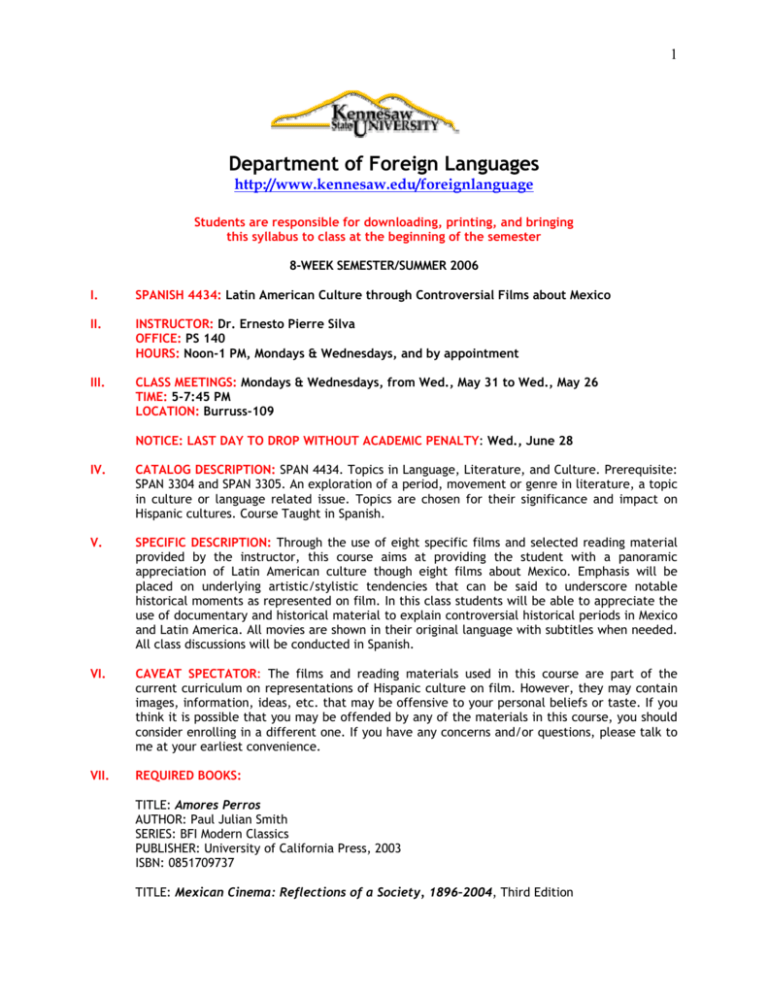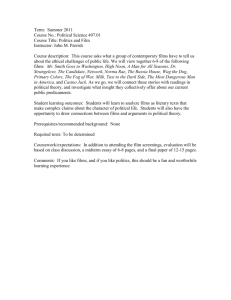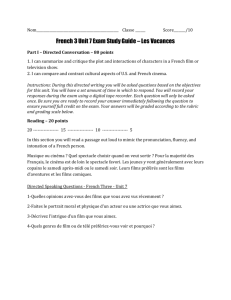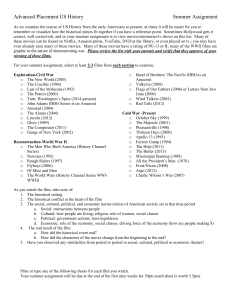4434 - Kennesaw State University
advertisement

1 Department of Foreign Languages http://www.kennesaw.edu/foreignlanguage Students are responsible for downloading, printing, and bringing this syllabus to class at the beginning of the semester 8-WEEK SEMESTER/SUMMER 2006 I. SPANISH 4434: Latin American Culture through Controversial Films about Mexico II. INSTRUCTOR: Dr. Ernesto Pierre Silva OFFICE: PS 140 HOURS: Noon-1 PM, Mondays & Wednesdays, and by appointment III. CLASS MEETINGS: Mondays & Wednesdays, from Wed., May 31 to Wed., May 26 TIME: 5-7:45 PM LOCATION: Burruss-109 NOTICE: LAST DAY TO DROP WITHOUT ACADEMIC PENALTY: Wed., June 28 IV. CATALOG DESCRIPTION: SPAN 4434. Topics in Language, Literature, and Culture. Prerequisite: SPAN 3304 and SPAN 3305. An exploration of a period, movement or genre in literature, a topic in culture or language related issue. Topics are chosen for their significance and impact on Hispanic cultures. Course Taught in Spanish. V. SPECIFIC DESCRIPTION: Through the use of eight specific films and selected reading material provided by the instructor, this course aims at providing the student with a panoramic appreciation of Latin American culture though eight films about Mexico. Emphasis will be placed on underlying artistic/stylistic tendencies that can be said to underscore notable historical moments as represented on film. In this class students will be able to appreciate the use of documentary and historical material to explain controversial historical periods in Mexico and Latin America. All movies are shown in their original language with subtitles when needed. All class discussions will be conducted in Spanish. VI. CAVEAT SPECTATOR: The films and reading materials used in this course are part of the current curriculum on representations of Hispanic culture on film. However, they may contain images, information, ideas, etc. that may be offensive to your personal beliefs or taste. If you think it is possible that you may be offended by any of the materials in this course, you should consider enrolling in a different one. If you have any concerns and/or questions, please talk to me at your earliest convenience. VII. REQUIRED BOOKS: TITLE: Amores Perros AUTHOR: Paul Julian Smith SERIES: BFI Modern Classics PUBLISHER: University of California Press, 2003 ISBN: 0851709737 TITLE: Mexican Cinema: Reflections of a Society, 1896–2004, Third Edition 2 AUTHOR: Carl J. Mora PUBLISHER: McFarland & Company, 2005 ISBN: 0786420839 TITLE: Diccionario Larousse del español moderno AUTHOR: Ramon Garcia Palayo y Gross PUBLISHER: Signet, 1983 ISBN: 0451168097 TITLE: Diccionario de sinónimos, antónimos e ideas afines AUTHOR: Aaron Alboukrek and Gloria Fuentes S. PUBLISHER: Larousse Mexico, 2002 ISBN: 970220027X OPTIONAL BOOK: TITLE: A Short Guide to Writing about Film, Fifth Edition AUTHOR: Timothy Cardigan PUBLISHER: Longman New York, 2003 ISBN: 0321096657 VIII. SCHEDULE: [Subject to change if necessary] JUNE FIRST WEEK W 31 M5 W7 Leering Askance: How to Un-Read Films about Mexico, Part 1 Sam Pekingpah’s Bring Me the Head of Alfredo García [112m, 1974] Sam Pekingpah’s Bring Me the Head of Alfredo García [112m, 1974] Leering Askance: How to Un-Read Films about Mexico, Part 2 Tony Scott’s Man on Fire [149m, 2004] SECOND WEEK M 12 W 14 Ω Tony Scott’s Man on Fire [149m, 2004] The End of History: Deconstructing Faux Documentaries Felipe Cazals’s Canoa [115m, 1975] Turn in Film Critique 1 about Bring Me the Head of Alfredo García THIRD WEEK M 19 W21 Ω Felipe Cazals’s Canoa [115m, 1975] Mapping the Psyche: The City as a Strange Place Jaime Humberto Hermosillo’s María de mi corazón [120m, 1979] Turn in Film Critique 2 about Man on Fire FOURTH WEEK M 26 W 28 Ω Jaime Humberto Hermosillo’s María de mi corazón [120m, 1979] The Politics of “la dedocracia”: On Changing the Old Regime Luis Estrada’s La ley de Herodes [120m, 1999] Turn in Film Critique 3 about Canoa 3 JULY FIFTH WEEK M3 W5 Ω Luis Estrada’s La ley de Herodes [120m, 1999] Between a Rock and a Hard Place: The Confusion of Identities Arturo Ripstein’s La virgen de la lujuria [150m, 2002] Turn in Film Critique 4 about María de mi corazón EXAMEN PARCIAL SIXTH WEEK M 10 W 12 Ω Arturo Ripstein’s La virgen de la lujuria [150m, 2002] The Ugly, Hidden Truth: Racism in Mexico City Fernando Sariñana’s Amar te duele [104m, 2002] Turn in Film Critique 5 about La ley de Herodes SEVENTH WEEK M 17 W 19 Ω Fernando Sariñana’s Amar te duele [104m, 2002] The Dangerous City: Re-visiting Neorealism Gerardo Tort’s De la calle [84m, 2001] Turn in Film Critique 6 about La virgen de la lujuria EIGHT WEEK M 24 W 26 Ω IX. Ω Gerardo Tort’s De la calle [84m, 2001] The Catholic Church and Its Discontents EXAMEN FINAL Turn in Film Critique 7 about Amar te duele SPECIAL SHOWING: At some point during the Summer Semester, students will be required to attend a special showing of a film in the Foreign Language Resource Center. Carlos Carrera’s El Crimen del padre Amaro [118m, 2002] Carlos Carrera’s El Crimen del padre Amaro [118m, 2002] Turn in Film Critique 8 about El Crimen del padre Amaro X. FILM EVENT: At some point during the Summer Semester, students will be asked to attend a Film Event to take place outside of KSU. XI. LAB: The Foreign Language Resource Center is located in the Pilcher Building, room 134. If you need additional information, contact Dr. Francesco Scordato, Director, at 770.423.6022, or Ms. Patricia Tilbian, Coordinator, at 678. 797.2197. The hours of operation are Monday-Thursday 9:00 AM to 5:00 PM and Friday 11:00 AM to 4:00 PM. Also, you may contact their Webpage at http://www.kennesaw.edu/foreignlanguage/flrc.html XII. GENERAL EXPECTATIONS: 1. Students are expected to attend all classes. The maximum number of absences is 2. All absences, excused or unexcused, will be counted as absences. Each additional absence over the maximum will result in your final grade being lowered by FOUR points. If you must be absent from class, it is your responsibility to find out what the assignment was for that day and to turn your homework in on time. Should you be absent, find out what transpired in class by contacting a classmate: 4 NAME: ________________________; PHONE: _____________________; E-MAIL: ______________ NAME: ________________________; PHONE: _____________________; E-MAIL: ______________ 2. Classes will start on time. If for some reason you find it necessary to arrive late, you will be responsible for all information, including announcements changes in the syllabus, etc. Any behavior deemed disruptive by the instructor will result in your being asked to leave class at once. Such an event will be counted as an unexcused absence, and the student may be referred to the Dean of Students for further disciplinary action. For additional information, you may read http://www.kennesaw.edu/judiciary/code.conduct.shtml 3. Class time will be used to develop all four basic skills [listening comprehension, speaking, reading comprehension, and writing]. There is also an essential cultural component. However, special emphasis will be placed on speaking; thus, you must be willing to participate in class discussion. You are expected to study and practice what you learn at home as part of your daily preparation. For best results, you should study Spanish at least one hour daily. 4. All assignments, whether written or oral, are to be finished individually before the class begins. No late homework will be accepted. No make-ups of any kind will be given for any assignments or exams. Emergencies will be handled on an individual basis. There will be no “extra-credit.” XIII. ACADEMIC INTEGRITY: Every KSU student is responsible for upholding the provisions of the Student Code of Conduct, as published in the Undergraduate of Graduate Catalogs. Section II of the Student Code of Conduct addresses the University’s policy on academic honesty, including provisions regarding plagiarism and cheating, unauthorized access to University materials, misrepresentation/falsification of University records or academic work, malicious removal, retention, or destruction of library materials, malicious/intentional misuse of computer facilities and/or services, and misuse of student identification cards. Incidents of alleged academic misconduct will be handled through the established procedures of the University Judiciary Program, which includes either an “informal” resolution by a faculty member, resulting in a grade adjustment, or a formal hearing procedure, which may subject a student to the Code of Conduct’s minimum one semester suspension requirement. XIV. DISABILITY POLICY: Kennesaw State University provides program accessibility and reasonable accommodations for persons identified as disabled under Section 504 of the Rehabilitation Act of 1973 or the Americans with Disabilities Act of 1990. A number of services are available to help disabled. Students must visit the Office of Disabled Student Support Services [770/4236443] and arrange an individual assistance plan. In some cases, certification of disability is required. XV. STUDENT LEARNING OUTCOMES: This course will contribute to the attainment of the following general [GSLO] and specific [SSLO] student learning outcomes of the B.A. in Modern Language & Culture [ML&C]: GSLO ML&C 1: Language, Linguistics, & Comparisons Learners are proficient in using the target language, are familiar with the target language system, and seek opportunities to further develop their skills and knowledge. [Knowledge, Skills, Attitudes] SSLO ML&C 1.a.: Demonstrating Language Proficiency. Learners demonstrate a high level of proficiency in the target language, and they seek opportunities to strengthen their proficiency. [Knowledge, Skills, Attitudes] 5 To address this outcome, learners will improve their speaking skills by participating in ongoing, in-class discussions about pertinent topics dealing with societal issues in Spanishspeaking countries. Upon completion of the major in Modern Language & Culture, learners are expected to have achieved an Advanced-Low level on the ACTFL scale. Assessment: students are required to have a personal interview with the instructor to discuss their final projects. This is a class that emphasizes class discussion and intense participation. To address this outcome, learners will improve their listening skills by participating in different in-class activities during the semester where they will be required to engage in discussions about cultural manifestations in the targeted areas of study. Also, students must reach an understanding of the films watched. Assessment: communicative activities during class interactions will afford the student ample opportunity to interact with one other, by both listening and speaking. To address this outcome, learners will improve their writing ability by preparing several film reports and a lengthy research essay. Part of the learning outcome will involve teacher-student interactions in the process of writing by improving writing from rough draft to final product. Assessment: the ongoing writing and rewriting of film reports, exams, and a final research paper will provide ample opportunity to improve students’ writing abilities. To address this outcome, learners will improve their reading ability by reading from several source materials, including books, articles, and their own research work. Also, students will practice reading richly visual texts presented by the films shown in class. Assessment: several books and articles will be perused carefully to complement the visual texts as seen onscreen. GSLO ML&C 2: Cultures & Literatures Learners know the literature and culture of the target language countries. They use this knowledge to interpret and reflect upon the perspectives of the target culture in relation to its practices and products. [Knowledge, Skills, Attitudes] SSLO ML&C 2.a.: Demonstrating Cultural Understandings. Learners demonstrate that they understand the connections among the perspectives of a culture and its practices and products. [Knowledge, Skills] To address this outcome, learners will engage in reading historical and theoretical texts about films as cultural products. At the same time, students will write their views on the targeted culture in a series of assignments designed to enhance cultural understanding. Assessment: There will be ten feature films presented as part of the course; in addition, personal interviews will be conducted to the final research project is demonstrates a high level of cultural understanding. SSLO ML&C 2.b.: Demonstrating Understanding of Literary and Cultural Texts and Traditions. Learners recognize the value and role of literary and cultural texts and use them to interpret and reflect upon the perspectives of the target cultures over time. [Knowledge, Skills, Attitudes] 6 To address this outcome, learners will have the unique opportunity of viewing hard-to-find films about the targeted culture. The course is designed to expose students to a myriad of traditional and current cultural representations on film. Assessment: by viewing films with opposing perspectives on culture—from the country of origin as well as from the USA—students will learn to ascertain and discern how and why cultural assessments are formed. Such knowledge will be buttress by ongoing class discussions and readings on the subject matter. XVI. FINAL GRADE: Two Exams [15 points each] Final Essay Film Critiques [8] Participation/Homework Film Event TOTAL XVII. GRADE SCALE: A: B: C: D: F: XVIII. 30 20 20 20 10 ____ 100 90-100% 80–89% 70–79% 60–69% 0–59% WARNING: Failure to take the final exam at the time, date, and place scheduled will result in a final grade of “F.” Exceptions to this policy must be requested in writing by the student, endorsed in writing by the instructor, and approved, in writing, by Department Chair. Requests must be submitted two weeks prior to the end of the last day of class.







